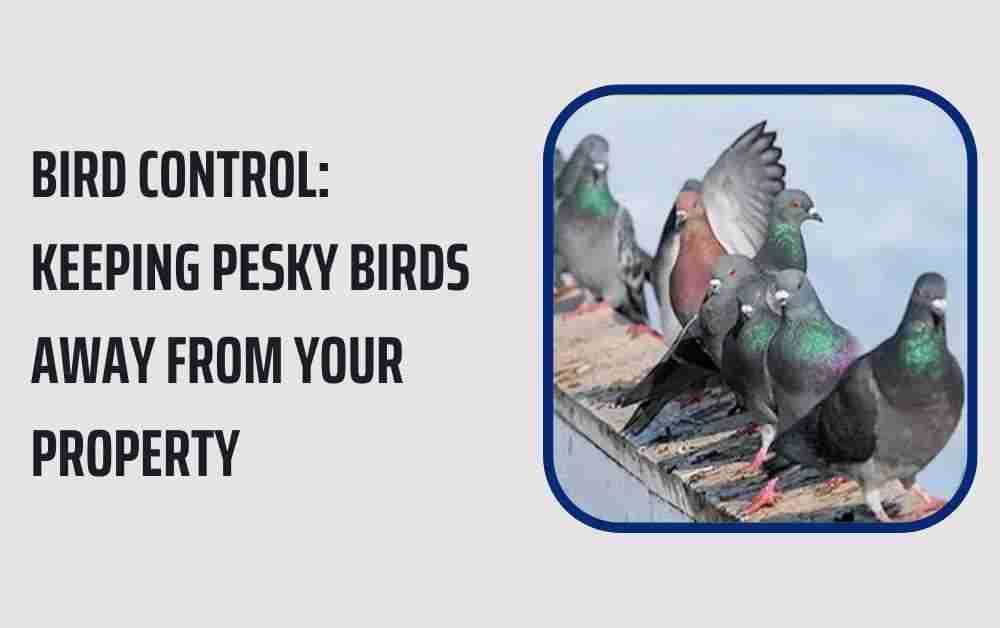
Birds are a beautiful part of nature, but they can also become a nuisance when they invade our properties. From noisy chirping to messy droppings, unwanted bird presence can cause various issues for homeowners and businesses alike. However, implementing effective bird control measures can help mitigate these problems and maintain a harmonious environment. In this guide, we’ll explore some simple yet efficient methods to keep pesky birds away from your property.
Understanding the Problem
Bird infestations can occur for several reasons, including the availability of food, water, and shelter. As humans continue to encroach upon natural habitats, birds often adapt by seeking refuge in urban and suburban areas. While this behavior is understandable from a survival standpoint, it can lead to conflicts with humans and property damage. Therefore, it’s essential to address bird control proactively to prevent these issues from escalating.
Bird Control
Common Bird Control Methods
Several strategies can deter birds from roosting and nesting on your property. These methods range from humane deterrents to physical barriers, each with its unique advantages. Let’s explore some popular bird control solutions:
1. Visual Deterrents
Visual deterrents leverage birds’ natural instincts to avoid perceived threats. These can include:
- Reflective Objects: Hang shiny objects like CDs or aluminum foil strips to create reflections and scare birds away.
- Predator Decoys: Place decoys of natural bird predators, such as owls or hawks, to create a sense of danger for pest birds.
- Scarecrows: Traditional scarecrows can be effective in keeping birds away from gardens and crops.
2. Auditory Deterrents
Auditory deterrents use sound to deter birds from settling in specific areas. Common options include:
- Ultrasonic Devices: Emit high-frequency sound waves that are unpleasant for birds but inaudible to humans.
- Bird Distress Calls: Play recordings of distressed bird sounds to signal danger and discourage nesting.
- Wind Chimes: The gentle clinking of wind chimes can disrupt birds’ peace and discourage them from staying.
3. Physical Barriers
Physical barriers prevent birds from accessing certain areas altogether. Some effective options include:
- Netting: Install bird netting to block off openings, roosting areas, and crops from bird intrusion.
- Spikes and Wires: Place spikes or wires on ledges, rooftops, and other surfaces where birds tend to land or perch.
- Electric Shock Systems: Low-voltage electric shock systems provide a mild deterrent without causing harm to birds.
Creating a Bird-Unfriendly Environment
In addition to specific control methods, modifying your property to be less attractive to birds can also help discourage infestations. Here are some tips:
1. Remove Food Sources
Birds are attracted to properties with readily available food. Keep outdoor areas clean by promptly removing fallen fruits, seeds, and crumbs. Secure garbage cans with tight-fitting lids to prevent scavenging.
2. Minimize Water Access
Birds need water to survive, so eliminating standing water sources can discourage them from sticking around. Repair leaky faucets, drain birdbaths regularly, and cover swimming pools when not in use.
3. Trim Trees and Shrubs
Overgrown vegetation provides ideal nesting spots for birds. Trim trees and shrubs near your property to reduce hiding places and make it less inviting for birds to settle in.
Also read :- Pest Control in Fujairah: Keeping Your Home and Business Safe
Humane Bird Control Practices
While it’s essential to address bird infestations, it’s equally crucial to do so in a humane manner. Here are some ethical considerations to keep in mind:
1. Avoid Harmful Traps
Avoid using traps or poisons that can harm birds or other wildlife. Opt for non-lethal deterrents and humane removal methods whenever possible.
2. Respect Legal Regulations
Before implementing bird control measures, familiarize yourself with local and federal regulations regarding bird protection. Some species are federally protected and require special permits for removal or relocation.
3. Seek Professional Assistance
If you’re unsure about the best course of action or dealing with a large-scale bird infestation, consider consulting with a professional pest control service. They can offer expert advice and implement effective, humane solutions tailored to your specific situation.
Conclusion
Dealing with unwanted birds on your property can be challenging, but with the right approach, you can effectively deter them without causing harm. By understanding the reasons behind bird infestations and implementing a combination of visual, auditory, and physical deterrents, you can create an environment that is less attractive to pesky birds. Remember to prioritize humane practices and respect legal regulations to ensure a harmonious coexistence between humans and wildlife. With persistence and patience, you can keep your property bird-free and enjoy a peaceful living space.
Note :- For a comprehensive overview of Bird Control and related concepts,a4everyone.org is a valuable source